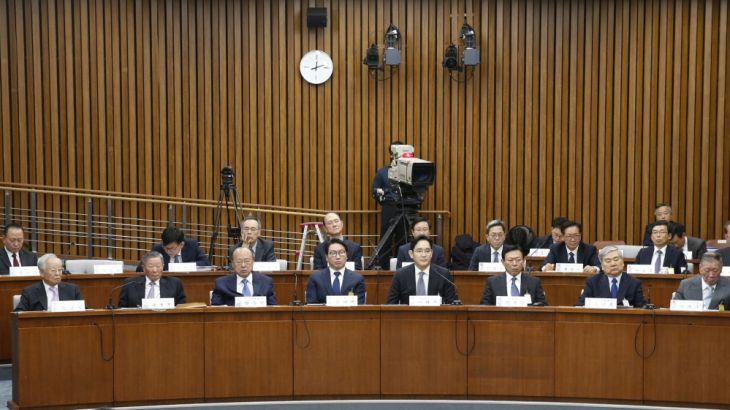Business elite grilled over Park scandal
South Korean President Park Geun-hye is facing an impeachment vote over a corruption scandal.

South Korean corporate chiefs have been accused of seeking favours when they made contributions to two foundations at the heart of a scandal that threatens the office of President Park Geun-hye.
|
|
On Tuesday, the corporate figures denied the charges in front of a parliamentary panel.
Nonetheless, the head of the GS Group, one of the nine conglomerate bosses summoned to appear at the unprecedented televised hearing, acknowledged that it was hard to say no to the government.
Al Jazeera’s Harry Fawcett, reporting from Seoul, said the questioning is a rare occurrence in South Korea.
“These people have an enormous amount of power, of influence, and a huge chunk of the South Korean economy – and yet they very rarely, if ever, submit themselves to this kind of questioning,” he said.
The bosses of conglomerates controlling revenue equivalent to more than half the country’s economy were questioned over whether they were pressured by Park, or a friend and aide, to give money to non-profit foundations, which backed initiatives put forth by Park, in exchange for special treatment.
“It’s a South Korean reality that if there is a government request, it is difficult for companies to decline,” said Huh Chang-soo, who heads the energy-to-retail GS Group and is also chairman of the Federation of Korean Industries, the main lobby group for the conglomerates known as chaebol.
Choi Soo-sil, a close friend of President Park Geun-hye, is currently awaiting trial on charges of coercion and abuse of power, while Park faces an impeachment vote in parliament on Friday which is almost certain to be adopted with the backing of more than 30 members of her own Saenuri Party.
Business elite
The witness list was a who’s who of South Korea’s business elite – including Samsung Electronics vice-chairman Lee Jae-yong, Hyundai Motors chairman Chung Mong-koo and Lotte chairman Shin Dong-bin.
Samsung, South Korea’s largest business group, made the biggest contributions of 20 billion won ($17m) to Choi’s foundations, followed by Hyundai, SK, LG and Lotte.
Samsung is separately accused of funnelling millions of dollars to Choi to bankroll her daughter’s equestrian training in Germany.
Samsung Group leader Lee Jae-yong, who sat at the centre of the witness table, said Park had asked him during one-on-one meetings for support in boosting cultural and sports-related developments, but did not specifically request money.
OPINION: South Korea’s political morass
“There are often requests from various parts of society, including for culture and sports. We have never contributed seeking quid pro quo. This case was the same,” Lee said, adding that he was embarrassed by the situation and was appearing with a “heavy heart”.
“I have so many weaknesses and Samsung has things to correct,” Lee responded when asked if he agreed with the public perception that the chaebols had knowingly colluded with Choi.
“I will take all responsibility related to the current situation, legal or ethical, if there is any,” said the 48-year-old Lee, the third-generation leader of the country’s biggest conglomerate, who received most of the panel’s questioning in the first two hours.
‘Arrest the chaebol chiefs’
The family-controlled chaebol – a term used to describe business conglomerates in South Korea – have long dominated Asia’s fourth-largest economy, working closely with the government in a system that helped the country rebuild from the ravages of the 1950-53 Korean war. But critics say they are due for reforms, including improved corporate governance and transparency.
![Labour unions and protesters have called for the president to step down over the scandal [EPA]](/wp-content/uploads/2016/12/6077f735d98d44d6a3ba17d54c6ebceb_18.jpeg)
The corporate titans ran a gauntlet of media and protesters as they entered the National Assembly building that sits along the southern bank of the Han River.
None of the chaebol, which are among 53 corporate groups that gave money to foundations linked to Park and Choi, has been accused of any wrongdoing in the case, but a protester outside the parliamentary building could be seen holding a sign saying: “Arrest the chaebol chiefs”.
Friday’s impeachment vote sets the stage for Park to be the first democratically elected South Korean leader to leave office early in disgrace. Huge demonstrations have called for her to quit and her approval rating has plunged to just four percent.
Last week she asked parliament to find a way and a time for her to step down, an offer that was rejected by the opposition Democratic Party as a stalling tactic.
Media reports said she may make a speech this week, offering to step down in April, a recommendation made by her conservative Saenuri Party.
|
|